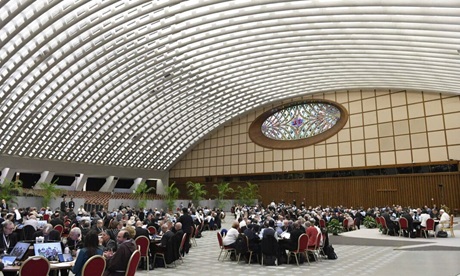Remember the Synod on Synodality? The synod has just produced its latest “working document” (instrumentum laboris) to direct the next round of discussion.
For the most part it’s more sensible than previous stages of the synod. It clears the way to discuss how the church might be synodal in a more grown-up way.
Some people are peeved that it hasn’t called for sweeping changes in church doctrine and discipline. They can’t think why their opinions aren’t driving the agenda.
Their synod experience has been similar for me, but not in the way you’d expect. Let me tell you my “consultation” story.
My story
In March 2024, a notice appeared in my Sunday parish bulletin, saying that my group of five local parishes had prepared a draft response to feed into the next stage of the synod. We were given three working days to comment on the draft.
Being a very regular mass-goer in this parish, I was surprised to learn that “we” had drafted anything. “We” must have been at it since October 2023, and it was now March 2024.
For some reason, “we” now had barely three working days to respond to a submission that none of us had seen.
I can never resist a challenge, so I emailed the man in charge, who I will call “Bernie.” I got myself a copy for comment.
The draft contained factual errors and plenty of boilerplate: calls for married clergy, women deacons, changes to teaching to welcome non-heterosexual people and so on.
It was interesting to see how confidently the authors wrote about the needs and desires of Catholic youth, when I suspected they hadn’t spoken to anyone at Mass aged under 40 for a long time.
There were no names on the draft, so I asked Bernie who wrote it. It turned out that Bernie and two other Boomer-age professional Catholic men, who I will call “Terry” and “Sean,” had written it.
I then asked Bernie how they wrote it, who else from the five parishes had been invited to contribute to it and why. He sent me a list of dates of purported meetings, but no minutes.
The draft submission certainly didn’t represent my views, nor the views of quite a few parishioners I know — none of whom had been included in this process.
Eventually Bernie told me that I should make my own submission to the relevant diocesan office, which I did on Monday 25 March, before the final deadline.
I also understood that I may as well have been pointing a radio telescope at a random part of the night sky and hoping to pick up a friendly wave from an alien civilisation.
I am still waiting for that office to acknowledge that they’ve received what I sent them. Actually, that’s not true. I’m not waiting at all, because I know it will never happen.
Being ignored
Many parishes and dioceses have useful people like Bernie who enjoy this sort of work. They have found the synodal process very appealing.
These useful people are usually retired ex-professionals, well off and well educated. They love taking part in processes like this to produce the outcomes they think are best for the church.
This usually follows a predictable pattern: calls to change traditional teachings on sex and marriage, and trying to laicise the clergy and clericalise the laity.
The non-elect are lucky to get three working days in which to “comment” on decisions already made.
So when I read that some Boomers were displeased by the new instrumentum laboris because they felt their views hadn’t been included, I’m sure you, and they, can forgive me for laughing out loud.
How does it feel to have the things that really matter to you—the things you wrote in a submission—completely ignored in a final document?
So while we’re all checking our privilege for next time, please say some prayers for the synod. If common sense can prevail, it may do some good.
Remember that the synod has bigger and more important things to handle than affluent daydreams from a very small corner of the universal Church.
- First published in The Catholic Weekly
- Dr Philippa Martyr is a Perth-based historian, university lecturer and academic researcher who currently works in mental health services.
